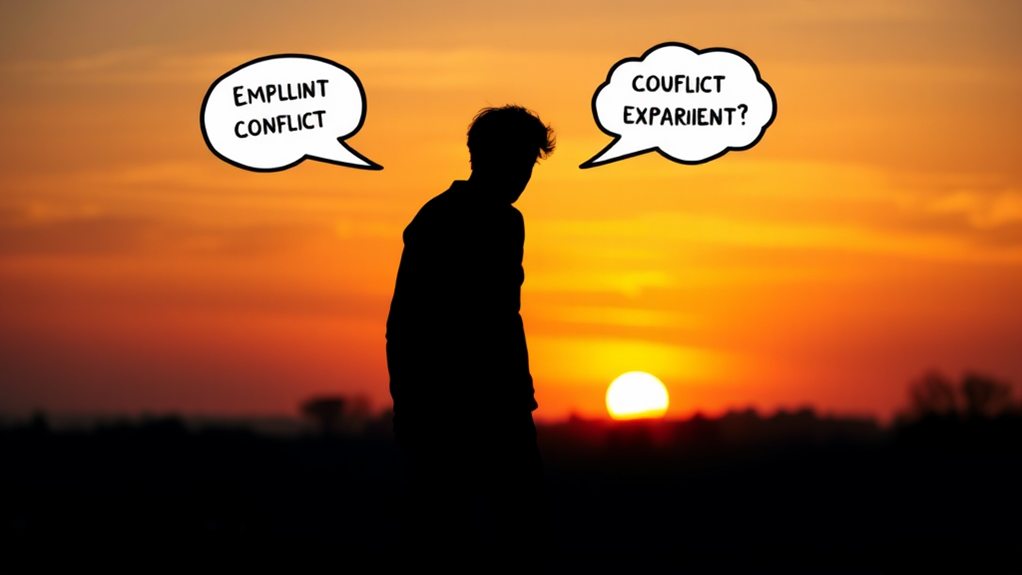Always Walk Away From an Argument With an Idiot
Arguments with unreasonable individuals drain mental energy and serve no productive purpose. Strategic disengagement becomes a powerful form of self-care, demonstrating emotional intelligence by recognizing unwinnable conversational battles.
Walking away is not surrender, but a deliberate choice to preserve psychological resources and maintain personal dignity. Silence can communicate more effectively than prolonged, futile debates, signalling confidence and emotional maturity.
Those who master the art of strategic withdrawal understand that engaging with individuals resistant to rational discourse only perpetuates unnecessary stress, making disengagement the wisest path forward. Curious about mastering this transformative skill?
Why Arguments Drain Your Energy
Arguments systematically consume psychological and emotional resources, often leaving individuals feeling depleted and frustrated.
- Argument fatigue emerges from the continuous mental exertion required to defend one’s perspective, counter opposing viewpoints, and maintain composure under tension. The emotional toll of these exchanges drains personal energy reserves, creating a neurological and physiological stress response that can persist long after the actual confrontation ends.
- Engaging in unproductive discussions triggers heightened cortisol levels, inducing mental exhaustion and potentially compromising rational thinking. Each argumentative interaction demands significant cognitive bandwidth, diverting mental resources from constructive activities and personal growth.
- The psychological investment required to sustain such interactions inevitably leads to emotional burnout, making strategic disengagement not just advisable, but essential for maintaining psychological well-being.
Recognizing Unproductive Conversational Patterns
Communication breakdowns often manifest through predictable conversational patterns that signal imminent unproductive dialogue. Toxic debates emerge when participants demonstrate closed minds, refusing to contemplate alternative perspectives or engage in genuine exchange.
- Warning signs include circular reasoning, ad hominem attacks, and emotional escalation that replaces logical discourse.
- Recognizing these patterns requires emotional intelligence and self-awareness. Indicators such as defensive body language, interrupting, speaking louder to dominate conversations, and consistently deflecting valid points reveal conversational impasses.
- When an individual repeatedly demonstrates an unwillingness to listen, process information objectively, or acknowledge nuanced viewpoints, disengagement becomes the most rational strategy.
- Strategic withdrawal preserves mental energy and maintains personal dignity, transforming potential confrontations into opportunities for personal growth and emotional regulation.
Strategic Disengagement as Self-Care
When interpersonal confrontations escalate beyond rational discourse, strategic disengagement emerges as a critical form of psychological self-preservation.
- Conflict resolution requires emotional intelligence that recognizes when continued engagement will only deplete personal resources and escalate tension. Walking away is not surrender, but a deliberate choice to protect one’s mental well-being.
- Effective strategic disengagement involves recognizing unproductive patterns, maintaining composure, and redirecting energy toward constructive interactions.
- By consciously choosing not to participate in emotionally charged exchanges, individuals preserve their psychological integrity and maintain personal boundaries.
- This approach transforms potential confrontations into opportunities for self-care, demonstrating mature emotional management and strategic personal leadership.
Silence Speaks Louder Than Words
In the domain of interpersonal dynamics, silence emerges as a profound communicative tool that often transcends verbal expression. Effective listening involves recognizing that non-verbal cues can communicate more powerfully than words, especially during tense interactions.
- Emotional intelligence allows individuals to understand that strategic silence serves multiple purposes: it can defuse potential conflicts, demonstrate self-control, and signal disinterest without escalating confrontations.
- Mastering the art of silence requires discipline and self-awareness. By choosing not to engage, one preserves mental energy and maintains personal dignity.
- The calculated pause becomes a statement itself conveying confidence, detachment, and a deliberate refusal to be drawn into unproductive exchanges that drain emotional resources and compromise rational thinking.
Preserving Mental Health and Dignity
Strategic withdrawal from arguments represents a profound mechanism for safeguarding psychological well-being and personal dignity. By practising mindful reflection, individuals can recognize unproductive confrontations that drain emotional resources and compromise inner peace.
- Establishing clear emotional boundaries becomes essential in managing interpersonal conflicts, allowing one to disengage without feeling defeated.
- The art of walking away is not surrender, but a calculated decision to protect mental health. It demonstrates emotional intelligence and self-respect, signalling that one’s inner equilibrium is more valuable than winning a futile debate.
- Choosing silence over escalation requires strength, wisdom, and a deep understanding that not every challenge demands engagement.
- Ultimately, preserving dignity means selecting interactions that nourish personal growth and mutual understanding.
Final Thoughts
Strategic disengagement from unproductive arguments represents a sophisticated form of emotional intelligence. Recognizing futile conversational patterns enables individuals to preserve psychological resources and maintain personal dignity.
The wisdom of walking away transcends momentary confrontational impulses, embodying a mature approach to interpersonal communication. Ultimately, selective engagement and strategic silence constitute powerful tools for maintaining intellectual and emotional equilibrium in complex social interactions.







